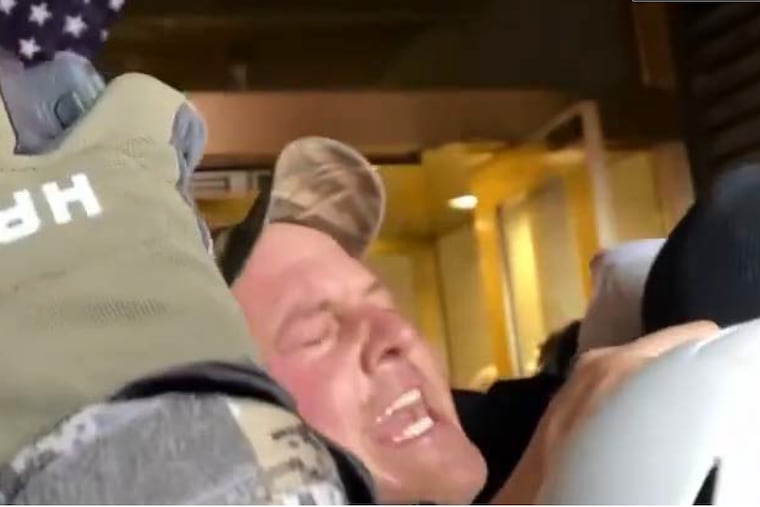South Jersey farmer sentenced to prison for shoving against police lines during Capitol attack
“What was I doing there? I honestly don’t know,” Ezekiel Stecher, of Mantua Township, said Wednesday. “I just couldn’t believe what was going on.”

WASHINGTON — A Gloucester County farmer was sentenced to two months behind bars Wednesday for the role he played in some of the heaviest fighting to occur during the Jan. 6, 2021, attack on the U.S. Capitol.
Ezekiel “Zeke” Stecher, 49, of Mantua Township, struggled in court to explain his participation in the melee that broke out that day in the building’s Lower West Terrace tunnel. As he jostled his way toward the entrance, other rioters in support of then-President Donald Trump shoved against police lines, brawled with officers, and eventually breached the building.
“What was I doing there? I honestly don’t know,” Stecher told U.S. District Judge Randolph D. Moss during his sentencing hearing in Washington. “I just couldn’t believe what was going on.”
But while the judge showed some sympathy toward Stecher’s characterization of his conduct that day as an aberration, he ultimately rejected the farmer’s request for a sentence of probation.
“He knew what was going on there,” the judge said. “He saw what was going on there. And he returned to that tunnel.”
Stecher, who runs a 150-acre fruit-and-vegetable farm that his family has owned since 1905, pleaded guilty in June to one count of interfering with police during a civil disorder.
He joins more than a dozen other New Jersey residents who have received prison terms for their roles in the unprecedented attack on Jan. 6, which interrupted congressional certification of President Joe Biden’s victory, caused more than $2.8 million in damage, and left scores of officers injured.
» READ MORE: Prominent South Jersey anti-vax advocate sentenced to jail for directing rioters in Capitol attack
In all, more than 1,100 people have been charged nationwide.
Stecher maintained Wednesday that he was an anomaly among many of those charged with participating in the tunnel brawl. He didn’t directly lay a hand on officers and immediately confessed when confronted months later by the FBI, defense attorney Michael E. Lowler said.
But prosecutors urged Moss to rebuff Stecher’s efforts to minimize what occurred that day.
The fighting in the tunnel — a 15-foot sloping hallway that has served as the backdrop to nine presidential inaugurations — lasted more than two hours as rioters repeatedly assaulted, threatened, shoved, and beat police with stolen shields and batons as they struggled to keep them at bay.
Video footage posted to social media showed Stecher forcefully pushing the crowd forward as he and others chanted slogans like “Our house!” and “Stop the Steal!”
» READ MORE: Self-described Haddonfield pickup artist and ‘relationship strategist’ convicted in Capitol riot case
Twice, Stecher retreated after officers blasted him with pepper spray. But both times he returned quickly after, rejoining the fracas.
“If we can’t push ‘em, drag ‘em,” he shouted to his fellow rioters during one of his breaks from the tunnel tumult.
And it was that remark that appeared Wednesday to give the judge pause.
Though he credited Stecher’s assertions that he didn’t arrive in Washington on Jan. 6 with any intention of storming the Capitol and acknowledged the dozens of letters he’d received from friends and family describing him as a hardworking businessman with an otherwise clean record, Moss said he couldn’t look past what prosecutors described as Stecher’s encouragement of violence.
“He did repeatedly return to what was probably the most sustained violence that day,” the judge said. “They were in danger. Those officers were in peril there.”
» READ MORE: A N.J. Marine reservist whose family says he ‘does stupid things sometimes’ pleads guilty to Capitol riot charges
Still, when it came to the sentence he imposed — which also included orders that Stecher pay $2,000 in restitution and complete two years’ probation upon his release — Moss appeared open to some measure of mercy.
When Lowler pushed the court to delay the start of Stecher’s prison term for 10 months to avoid disrupting the seasonal demands of his farming business, Moss said there may be “good reason” for granting such an unusual request.
“You have to plant the seedlings when you have to plant the seedlings,” the judge replied.
He ultimately deferred ruling on that request for at least several weeks, granting prosecutors an opportunity to oppose it in writing.